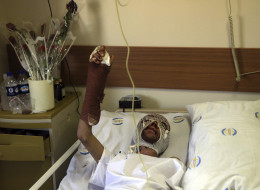
DUBAI, April 10 (Reuters) – A plane carrying 16 tonnes of emergency medical aid landed in the Yemeni capital Sanaa on Friday, the International Committee of the Red Cross said, the first delivery flown in by an international aid group after weeks of heavy fighting.
The ICRC and the United Nations have been trying for days to get aid flights into the country, where warplanes from a Saudi-led coalition have been launching air strikes against Houthi fighters battling to take over the southern port city of Aden.
The fighting has killed more than 600 people and driven more than 100,000 from their homes, leading aid organizations to warn of a looming humanitarian catastrophe in Yemen, the poorest country in the Arabian Peninsula.
“This plane has 16.4 tonnes of medical aid,” said the ICRC’s spokeswoman in Yemen, Marie Claire Feghali, speaking by telephone from Sanaa airport where the plane landed. The shipment included medicines, bandages, intravenous drips and surgical equipment.
The U.N. Children’s Fund (UNICEF) has been trying for a week to deliver supplies to Sanaa, negotiating with the Saudi-led coalition and other parties for landing and overflight rights.
Aden residents say electricity and water have been cut in several districts, rubbish has been left uncollected in the streets and hospitals have been unable to cope with the influx of wounded. (Reporting by Dominic Evans in Dubai and Stephanie Nebehay in Geneva; Editing by Michael Georgy and Andrew Heavens)

